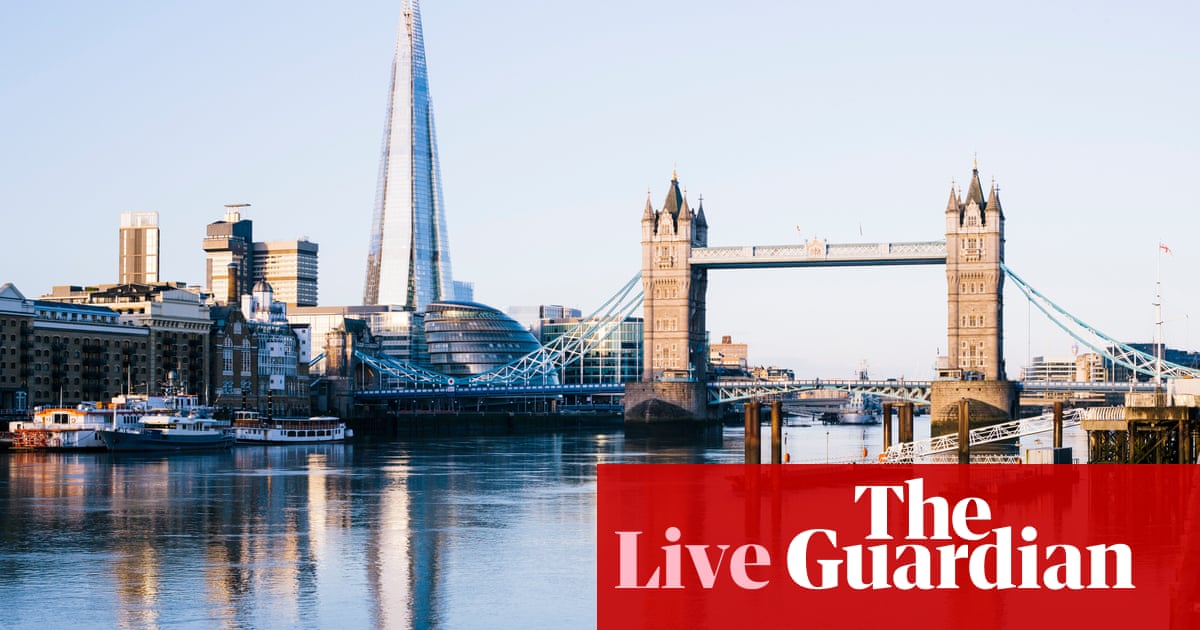Bussiness
Pound holds steady as business calls for ‘fresh start’ under Labour – business live

Key events
JPMorgan’s UK Economist Allan Monks said little is known about the details of Labour’s approach to fiscal policy, and this is unlikely to change immediately following the election result.
The party is communicating that there will be no major tax rises, no significant spending cuts and no slippage from the current fiscal rules, all while boosting trend growth. Absent good luck, it will be difficult to achieve all these commitments over the next parliament, in our view.
From a strategy perspective, Mislav Matejka, the bank’s head of global and European equity strategy, rates the UK equity market overweight, with a preference for the FTSE-250 over FTSE-100, and sees a Labour win as positive for banks and homebuilders, mixed for utilities and general retail and less positive for transport and energy sectors.
Make UK: ‘Business will welcome such a clear result’
Stephen Phipson, chief executive of Make UK, said:
Business will welcome such a clear result and an end to the political and economic instability of the last few years which is essential for companies to now bring forward much needed investment.
Looking ahead, the new government has a lot in its in-tray to address. First and foremost is the urgent need to kick start the UK’s anaemic growth levels of recent years and, boost investment in our infrastructure, without which we cannot address the many urgent priorities the country faces at national and regional level.
A modern, long-term industrial strategy which tackles the skills crisis in particular will be key to delivering this growth. Manufacturers stand ready to work with the new government and all stakeholders as a matter of urgency to help deliver this.
Analysts: ‘Some upside to GDP, inflation and rates forecasts’
Paul Dales, chief UK economist at Capital Economics, said the new government’s policies mean economic growth could be higher.
The big shift in the political landscape that has delivered the first Labour government since May 2010 is unlikely to lead to anything like as big a shift in the economic landscape.
But at the margin, the policies of the new Labour government generate some upsides to our GDP, inflation and interest rate forecasts. The stability of the pound overnight is no surprise as a Labour win was already priced into the markets.
“The economy may give Labour a helping hand,” he said. He explained:
Labour is taking over just as inflation has fallen back to the 2% target and the Bank of England is on the cusp of cutting interest rates from 5.25%. Our forecasts that inflation will fall a bit further and the Bank will cut rates to 3% next year explains why we think GDP growth will accelerate, to 1.2% this year and to 1.5% in both 2025 and 2026.
Moreover, our current estimate is that at the first fiscal event after the election (probably in September), the Office for Budget Responsibility will grant Labour fiscal headroom of around £16bn (0.6% of GDP), up from £8.9bn (0.3%) in the March budget.
That may mean Labour can raise spending a bit further than planned without raising taxes or borrowing by more than planned. Looser fiscal policy, though, may just mean inflation is a little higher and interest rates don’t fall as far.
“What a difference five years makes, Labour have turned themselves around” and are on course for a decisive victory, Kathleen Brooks, research director at the currency broker XTB, said.
Since the result is broadly as expected, the pound has had a muted reaction to [the] news. Due to this, the focus will now shift to what the future holds. Sir Keir Starmer still needs to lay out in more detail his plans for spending and taxation, and, most importantly, how he will grow the economy.
The financial markets trust that the UK’s fiscal position is secure with Labour, hence why bond yields and the pound have remained stable during this election campaign. The focus now will quickly shift to Starmer’s first 100 days in office, and how he lays out his economic plans to boost growth at the same time as improving public services.
Investors will be watching to ensure that Keir Starmer maintains his ‘stability’ message and fiscal prudence, otherwise he could find that the bond vigilantes are never far away. Ultimately, it’s the bond market that will determine Labour’s fiscal policies.
Sterling best-performing currency against dollar this year; investors say ‘boring is good’
Sterling has firmed slightly this morning. It has risen since Rishi Sunak called the election in late May, and is the strongest-performing major currency against the dollar this year, with a gain of 1.2%.
Laura Foll, portfolio manager at Janus Henderson Investors, said:
It’s a breath of fresh air to be running [UK] equities in a market where the election is seen as a non-event.
I’m hoping we’re going back to an era where boring is good and politics treads lighter in people’s lives. It will be a more gradual lifting [of confidence].
Government borrowing costs were little changed, with the yield (or interest rate) on the 10-year gilt rising by 6 basis points.
Introduction: Pound holds steady as business calls for ‘fresh start’ under Labour
Good morning, and welcome to our rolling coverage of business, the financial markets and the world economy.
We’ve woken up to a landslide Labour victory in the UK.
Keir Starmer has pledged that it is “now time for us to deliver” as his party’s election victory brings an end to 14 years of Conservative rule. The Labour leader is expected to become prime minister later today.
Rishi Sunak’s party is on track to record its worst ever performance in a general election.
As the results are broadly as expected and already priced into financial markets, the pound held steady. It has firmed slightly against the dollar, by 0.1% at $1.2770, and was up a smidgen against the euro at €1.18.
Stock market futures are pointing to a higher open on the FTSE 100 index in an hour.
The London Chamber of Commerce said the business community looks forward to a “fresh start” under Labour.
Chief executive Karim Fatehi said:
We look forward to working with government over the coming years to build a London where businesses of all sizes thrive.
Now is the time for the new government to quickly make the changes businesses need to succeed. As laid out in our manifesto this includes the introduction of policies that protect and support the capital’s businesses, enhance London’s international competitiveness, and simplify and enable infrastructure and planning. These policies will lay the foundations for future growth, address long term skills shortages, and foster greater innovation in our capital.
The CBI business group said “business stands ready to bring its innovation, ideas, and investment to make that shared mission a reality”.
Rain Newton-Smith, CBI’s chief executive, said:
The new prime minister has been given a clear mandate to take the tough decisions on areas like planning reform and boosting grid capacity needed to get the economy firing on all cylinders. What firms need now is a government that’s ready to hit the ground running and is laser-focused on delivery.
Households and businesses across the UK have shown incredible resilience through Brexit, Covid and war in Europe. With the economy picking up steam, now is the moment to get behind growth. Setting out a positive vision for the UK economy and leaning into our international leadership should be top priorities for the first 100 days.
The TUC said Labour has a “historic opportunity” to “repair and rebuild Britain”.
The union’s general secretary Paul Nowak said:
The trade union movement stands ready to work with this new government to deliver the change working families desperately need.
This means tackling the scourge of insecure work and boosting living standards. It means fixing our crumbling public services. And it means reversing over a decade of Tory stagnation with a proper plan for growth and industrial revival.
And this is the country following 14 years of Conservative rule:
The Agenda
-
7am BST: Halifax house price index for June
-
7am BST: German industrial production for May
-
7.45am BST: France trade and industrial production for May
-
10m BST: Eurozone retail sales for May
-
1.30pm BST: US non-farm payrolls for June (forecast: +190,000), unemployment rate (forecast: unchanged at 4%)








